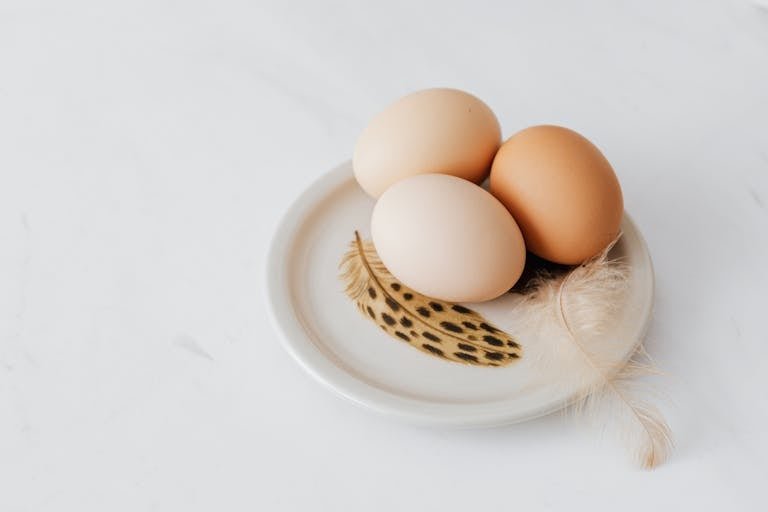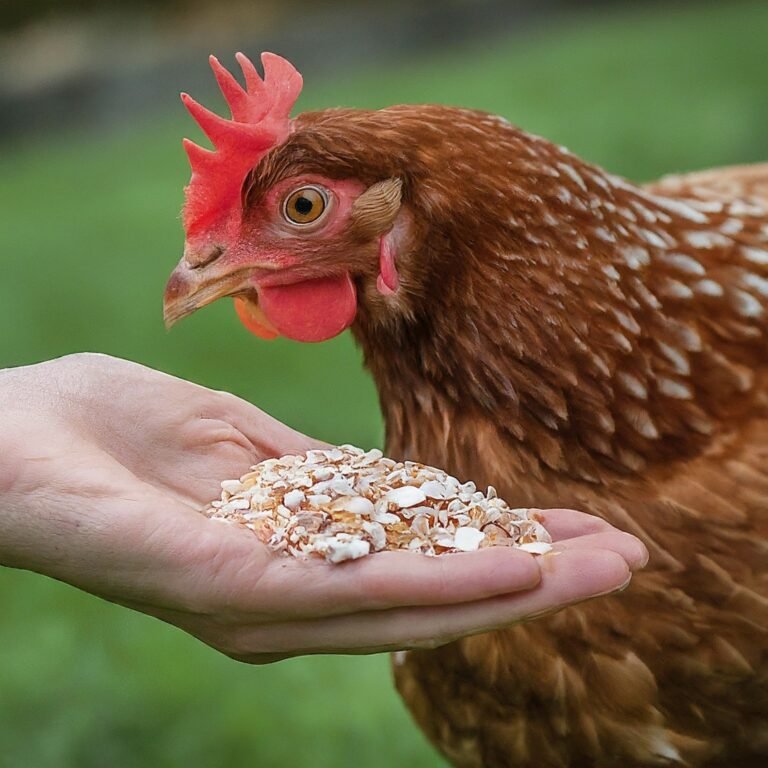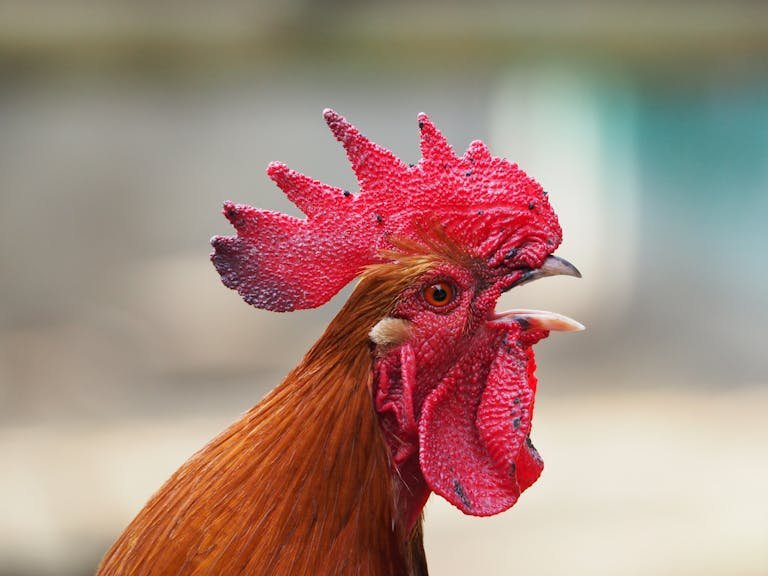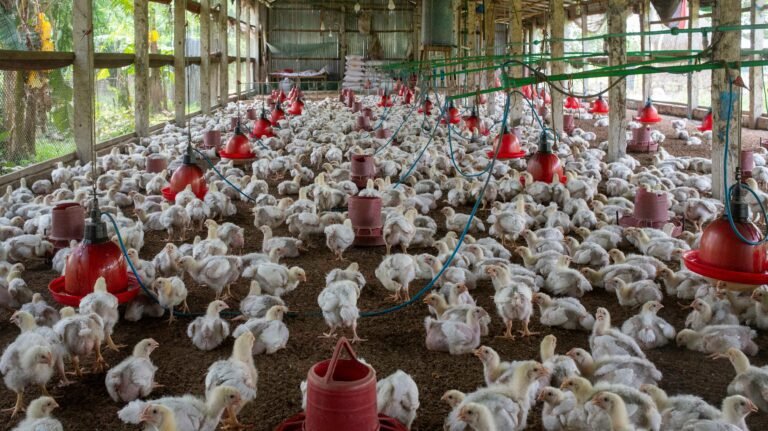Can Chickens Eat Pineapple? Health Benefits, Risks & Tips
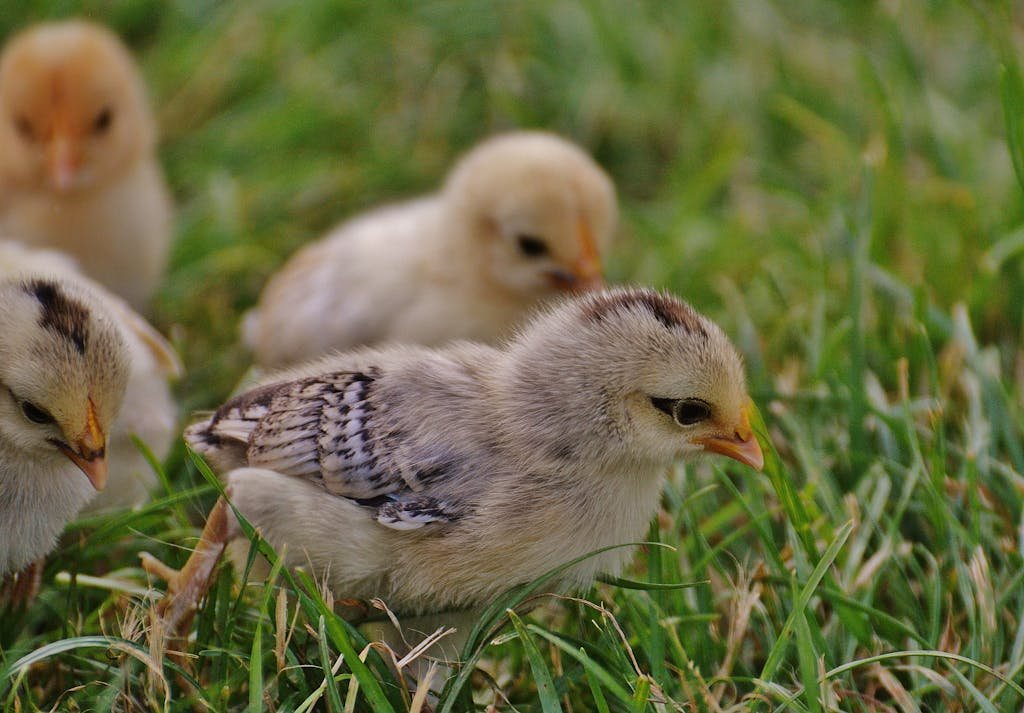
If you’re a chicken keeper like me, you probably enjoy finding new ways to keep your flock healthy and happy. A common question that comes up is: Can chickens eat pineapple? This tropical fruit, with its sweet and tangy flavor, is a favorite for many people. But is it safe and beneficial for chickens? This guide will explore the nutritional benefits, risks, preparation tips, and best practices for feeding pineapple to your feathered friends.
Why Pineapple is an Interesting Option for Your Chickens
As someone who writes about chicken care, I’ve noticed that introducing variety into a chicken’s diet is crucial for their health and happiness. Pineapple is one of those fruits that raises curiosity because of its unique texture, flavor, and nutritional profile. But why should you even consider it?
Nutritional Benefits of Pineapple for Chickens
Pineapple isn’t just a delicious treat for humans—it’s packed with nutrients that can also benefit chickens:
| Nutrient | Impact on Chickens |
|---|
| Vitamin C | Boosts immunity, helping chickens fight infections. |
| Manganese | Supports bone development and enzyme activity. |
| Bromelain | Aids digestion by breaking down proteins and improving gut health. |
| Water Content | Keeps chickens hydrated, especially during hot summer months. |
Recommended: Studies confirming the benefits of bromelain and Vitamin C for poultry health.
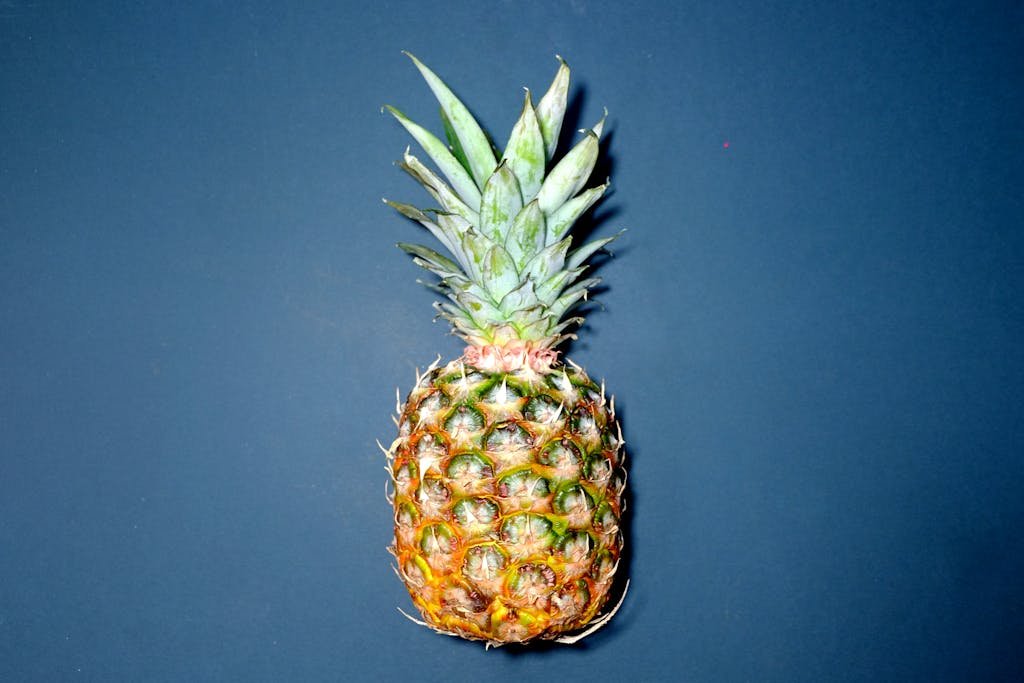
Is Pineapple Safe for Chickens? Let’s Debunk the Myths
Yes, chickens can safely eat pineapple, but there are a few misconceptions I want to address:
- Pineapple is Toxic: This is false. Unlike some fruits that are harmful to poultry (e.g., avocado pits), pineapple is entirely safe when given in moderation.
- Chickens Can’t Digest Pineapple: While the core can be tough for chickens to digest, the flesh is perfectly fine and easy for them to eat when properly prepared.
- High Sugar Means It’s Unsafe: While pineapple does contain sugar, small amounts as a treat won’t harm your chickens if their overall diet is balanced.
Preparing Pineapple the Right Way for Your Flock
When it comes to feeding pineapple to your chickens, preparation is key. Improperly prepared fruit can lead to choking or digestive issues. Here’s how I recommend preparing pineapple:
- Select Fresh Pineapple: Choose a ripe pineapple with bright green leaves and firm flesh. Avoid fruits that are overripe, bruised, or moldy.
- Remove the Skin and Core: The tough outer skin and hard core of the pineapple aren’t suitable for chickens. Use a sharp knife to carefully remove these parts.
- Cut Into Bite-Sized Pieces: Chickens don’t chew like humans, so small pieces (around ½ inch) are easier for them to eat and digest.
- Serve Fresh: Always serve fresh pineapple and avoid canned varieties, as these often contain added sugar or preservatives that aren’t good for chickens.
Also Study: Is Moldy Bread Safe for Chickens?
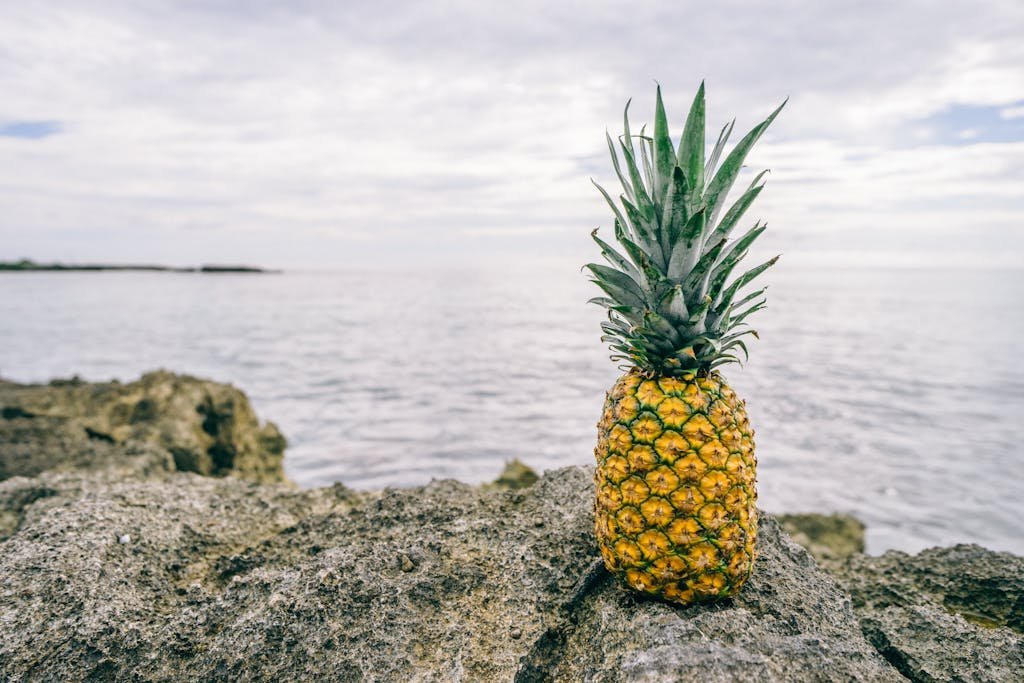
How to Feed Pineapple to Chickens
Now that the pineapple is ready, let me walk you through the best ways to serve it to your flock:
- Start Small: Introduce a few pieces and monitor your flock’s reaction.
- Serve as a Treat: Pineapple should complement a balanced diet, not replace regular feed.
- Scatter or Use a Dish: Offer pieces in a shallow dish or scatter them on the ground for enrichment.
- Monitor for Side Effects: Watch for signs of digestive discomfort, such as diarrhea or reduced appetite.
Diarrhea in chickens often looks like watery droppings with unusual consistency. If this occurs, stop feeding pineapple and consult a vet.
Benefits of Feeding Pineapple to Chickens
When offered correctly, pineapple can provide several benefits for your chickens:
- Boosts Immunity: The Vitamin C content strengthens the immune system.
- Supports Digestion: Bromelain aids in breaking down food, improving gut health.
- Hydration: Its water content keeps chickens hydrated, especially during hot summers.
- Enrichment: Offering pineapple adds variety to their diet, keeping them engaged and reducing boredom.
Read Also: Stop Your Chickens’ Diarrhea Now: Effective Home Remedies
Risks and Precautions
While pineapple has clear benefits, overfeeding can lead to problems:
- Digestive Issues: Too much pineapple can cause diarrhea due to its acidity and sugar content.
- Weight Gain: High sugar levels may contribute to obesity if overfed.
- Nutrient Imbalance: Relying too much on treats disrupts their balanced diet.
To avoid these issues, I suggest limiting pineapple to once or twice a week in small portions.
Related: How to Prevent Obesity in Poultry.
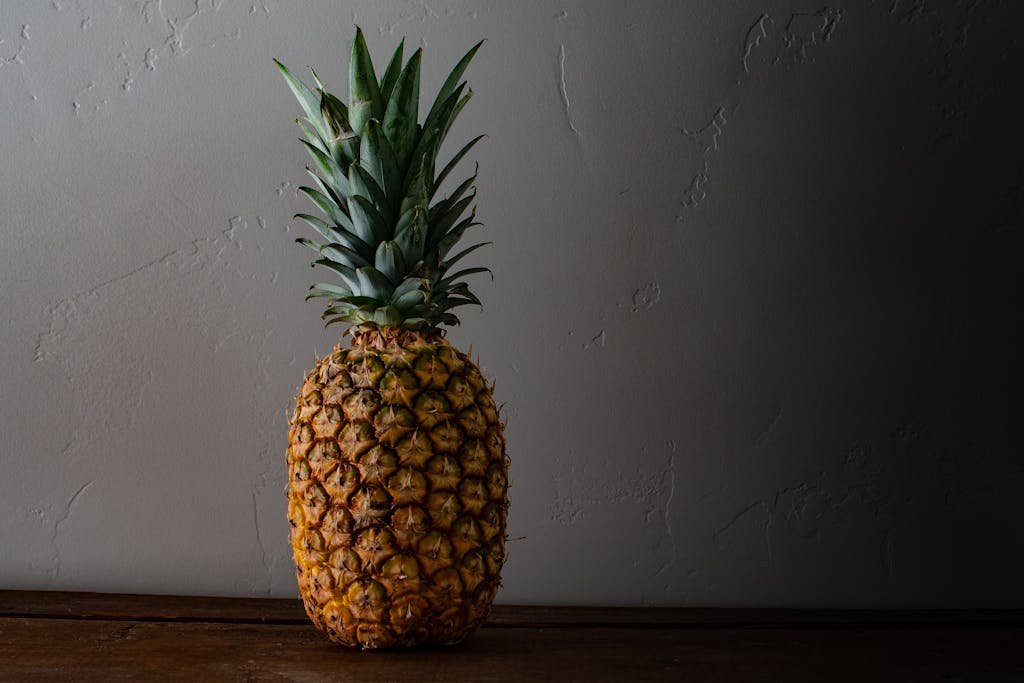
Comparison Chart: Safe vs. Unsafe Fruits for Chickens
| Fruit | Safe for Chickens? | Nutritional Benefits | Feeding Tips |
|---|---|---|---|
| Pineapple | Yes | Vitamin C, Bromelain | Remove the core and cut it into small pieces |
| Watermelon | Yes | Hydration, low sugar | Serve in small chunks |
| Avocado | No | Contains toxic things | Avoid entirely |
| Berries | Yes | Rich in antioxidants | Offer whole or halved |
| Citrus | Yes (in moderation) | Vitamin C | Serve sparingly due to acidity |
FAQs
1. How much pineapple is safe for chickens?
Small portions, such as a few bite-sized pieces per chicken, once or twice a week, are ideal.
2. Can chickens eat pineapple skin or core?
No, the tough skin and hard core are difficult to digest and should be removed.
3. What are the signs of pineapple overfeeding?
Symptoms like diarrhea, lethargy, or reduced appetite may indicate overfeeding.
4. Are other tropical fruits safe for chickens?
Yes, fruits like papaya and mango are safe in moderation but avoid overly acidic or sugary options.
5. Can pineapple improve egg quality?
While pineapple’s nutrients boost general health, its impact on egg quality is minimal without a balanced diet.
Read Also: Marek’s Disease in Chickens: Prevent, Detect, Protect Your Flock
Final Thoughts
Pineapple is a safe and nutritious treat for chickens when served in moderation and prepared properly. Its Vitamin C and hydration benefits make it especially useful during warm weather.
Introduce pineapple gradually, monitor for side effects, and rotate it with other safe fruits like watermelon and berries. By doing so, you’ll add variety to your flock’s diet while keeping them healthy and happy.
Explore more tips on “Feeding Chickens in Summer” or check out “Best Fruits for Chickens’ Diet” for additional ideas.
